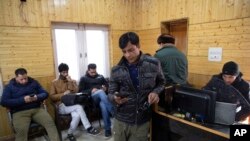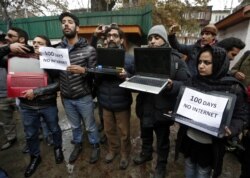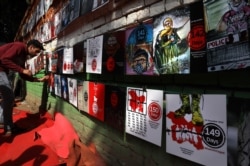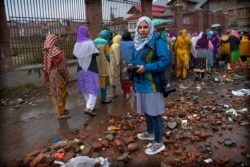High-speed internet has been an integral part of the response to COVID-19, with people dependent on it for work, school and access to news and information.
But in Kashmir, a ban on high-speed internet imposed by the Indian government is preventing individuals from accessing and sharing vital information, local journalists say.
Kashmiris were cut off from the internet for seven months when the Indian government imposed a blackout in August after revoking the state’s semi-autonomous status. Service was partially restored in March, to allow for 2G on cellphones.
In a Supreme Court hearing Monday, the Jammu and Kashmir government said 2G was sufficient and warned that high-speed internet could be misused to spread false news or help extremists plan attacks.
Bilal Hussain, a Kashmir-based journalist, told VOA the ban on high-speed internet has limited access to information needed by doctors and journalists. It took Hussain nearly six hours to send a two-minute video to VOA from Kashmir.
“We are forced to work on 2G, and it’s incredibly frustrating. Doctors in Kashmir are not even able to download material they need for COVID-19,” Hussain said.
“In addition to restrictions on communication, journalists are forced to observe a self-imposed censorship, and not go against the state narrative otherwise it can land you in trouble like other reporters in the region who have been booked for their work,” Hussain said.
Indian authorities have charged at least four journalists in Kashmir since the pandemic lockdown, including Gowhar Geelani.
“Since August, when the region lost its semi-autonomous status and statehood, the crackdown has got intense and has grown very, very ugly,” Geelani said.
“The aim seems to be to control the narrative and have only one kind of view, which is the government's administration view,” he said.
Communication blackout
The lack of internet access during the pandemic is “aiding its spread and gambling with people’s lives,” according to Access Now. The global digital rights group has been monitoring Kashmir since the August blackout.
As of Tuesday, India has reported 46,711 cases and 1,583 deaths from the coronavirus, with the state of Jammu and Kashmir accounting for 726 cases and eight deaths. Jammu and Kashmir ranks 12th-highest in the number of reported cases in India’s 36 states and territories.
Samuel Woodhams, a London-based digital rights researcher, said that although 2G allows a degree of connectivity and online presence, it is “rendered ineffective” in a 4G and 5G society.
“2G is so slow that even basic web pages like Google may not load,” he told VOA. With a messaging service like WhatsApp, Woodhams said, “You are sending messages, your ability to share an image or video or livestream on social media would be massively impacted. In fact, I think essentially impossible.”
He said that India’s use of bandwidth throttling, or the slowing of internet connections, is a “deliberate attempt to avoid public and international scrutiny.”
“Governments can claim that it isn’t an internet blackout or communication shutdown by allowing the internet to be at a certain pace and yet at the same time slowing it to such a speed that it is rendered ineffective and basically unusable,” Woodhams said.
Prime Minister Narendra Modi’s government imposed the communication blackout last August after authorities abolished Kashmir’s status as a semi-autonomous state under article 370 of the Indian constitution.
For two months, phone lines and internet services remained completely cut off. Call service was resumed in two phases: in October for post-paid mobile phones — plans paid monthly — and in January for pre-paid mobile phones — a more widely used plan.
Internet was restored in March but restricted to 2G services for mobile phones.
Modi said that the internet blackout was to prevent the spread of terrorism.
“Kashmir’s special status had been used by our neighbors [Pakistan] as a weapon to incite people of the region against India. But now India will rid the region of terrorism and terrorists,” Modi said in a televised address after article 370 of the constitution was revoked.
The director general of Jammu and Kashmir Police, Dilbagh Singh, said that progress in eradicating terrorism in Kashmir could be attributed to the government’s lockdown.
The director of communications for Jammu and Kashmir did not respond to VOA’s email requesting comment.
Since Kashmir’s status was changed, authorities have filed charges against about 20 journalists, four of whom were charged since the pandemic lockdown began March 24.
Between April 20 and 22, Indian authorities charged journalists Geelani, Masrat Zahra, and Peerzada Ashiq with “misusing social media” to “glorifying terrorism” and posting “fake news.” A fourth journalist, Mushtaq Ahmad from the Kashmir Observer, was charged with violating lockdown rules.
The Jammu and Kashmir police headquarters did not respond to VOA’s request for comment, submitted via its web portal, on the arrests.
Geelani said he heard about the charges via a statement issued by the inspector general of the Jammu and Kashmir police that circulated on WhatsApp. The statement said he was accused of posting “explicitly seditious, incendiary and incriminating texts on social media, challenging the sovereignty and integrity of India and attempting to instigate people for violence.”
Authorities charged Zahra, a Srinagar-based photojournalist, under the Unlawful Activities Prevention Act for “misuse of social media” and accused her of “glorifying terrorism.” She told VOA that authorities questioned her about pictures on her social media accounts.
“They told me that there are some posts that could provoke the youth in Kashmir. … They talked to me about one picture that I took in September 2018 of a Shia Muharram procession. A mourner was carrying a poster of the Kashmiri rebel commander Burhan Wani, who was killed in 2016, and [whose death] led to the 2016 uprising,” Zahra said. “I was there as a photojournalist; the picture was published by Getty Images.”
Ashiq, a Kashmir-based reporter for the English-language daily The Hindu, was charged with publishing “fake news” on COVID-19. The charge relates to an April 15 report that alleged that the Directorate of Health Services had stopped collecting samples of possible coronavirus cases in Srinagar.
The director of information and public relations in Kashmir, Syed Sehrish Asgar, rebutted the allegations in Ashiq’s story.
Aliya Iftikhar, from the press freedom organization Committee to Protect Journalists, said the charges against the journalists were “ridiculous and far-fetched,” especially amid the health crisis.
“This is part of an ongoing crackdown on the free press in Kashmir, which has happened steadily throughout history, but has certainly accelerated under Modi,” Iftikhar told VOA. “It certainly looks like the Indian government is trying to use this time where everyone is so focused on the pandemic to distract from what they are doing in Kashmir.”







